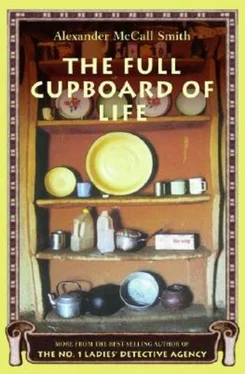Alexander Smith - The Full Cupboard of Life
Здесь есть возможность читать онлайн «Alexander Smith - The Full Cupboard of Life» весь текст электронной книги совершенно бесплатно (целиком полную версию без сокращений). В некоторых случаях можно слушать аудио, скачать через торрент в формате fb2 и присутствует краткое содержание. Жанр: Триллер, на английском языке. Описание произведения, (предисловие) а так же отзывы посетителей доступны на портале библиотеки ЛибКат.
- Название:The Full Cupboard of Life
- Автор:
- Жанр:
- Год:неизвестен
- ISBN:нет данных
- Рейтинг книги:4 / 5. Голосов: 1
-
Избранное:Добавить в избранное
- Отзывы:
-
Ваша оценка:
- 80
- 1
- 2
- 3
- 4
- 5
The Full Cupboard of Life: краткое содержание, описание и аннотация
Предлагаем к чтению аннотацию, описание, краткое содержание или предисловие (зависит от того, что написал сам автор книги «The Full Cupboard of Life»). Если вы не нашли необходимую информацию о книге — напишите в комментариях, мы постараемся отыскать её.
The Full Cupboard of Life — читать онлайн бесплатно полную книгу (весь текст) целиком
Ниже представлен текст книги, разбитый по страницам. Система сохранения места последней прочитанной страницы, позволяет с удобством читать онлайн бесплатно книгу «The Full Cupboard of Life», без необходимости каждый раз заново искать на чём Вы остановились. Поставьте закладку, и сможете в любой момент перейти на страницу, на которой закончили чтение.
Интервал:
Закладка:
Mma Ramotswe’s thoughts were interrupted by Mma Holonga. “A teacher, Mma,” the other woman said. “I said that he was a teacher.”
“I’m sorry,” said Mma Ramotswe. “I was dreaming there for a moment. A teacher. Yes, Mma, that is a good job to have, in spite of the cheekiness of young people these days. It is still a good thing to be a teacher.”
Mma Holonga nodded, acknowledging the truth of this observation. “His name is Bobologo,” she went on. “Mopedi Bobologo. He is a teacher at the school over there near the University gate. You know that one.”
“I have driven past it many times,” said Mma Ramotswe. “And Mr J.L.B. Matekoni, who is the man who runs this garage behind us; he has a house nearby and he says that he can hear the children singing sometimes if the wind is coming from that school.”
Mma Holonga listened to this, but was not interested. She did not know Mr J.L.B. Matekoni, and could not picture him, as Mma Ramotswe now did, standing on his verandah, listening to the singing of the children.
“This man is called Mr Mopedi Bobologo, although he is not like the famous Bobologo. This one is tall and thin, because he comes from the North, and they are often tall up there. Like the trees. They are just like the trees up in the North.
“He is a very clever man, this Bobologo. He knows everything about everything. He has read many books, and can tell you what is in all of them. This books says that. This book says this. He knows the contents of many books.”
“Oh,” said Mma Ramotswe. “There are many, many books. And all the time, more books are coming. It is difficult to read them all.”
“It is impossible to read them all,” said Mma Holonga. “Even those very clever people at the University of Botswana-people like Professor Tlou-they have not read everything.”
“It must be sad for them,” observed Mma Ramotswe reflectively. “If it is your job to read books and you can never get to the end of them. You think that you have read all the books and suddenly you see that there are some new ones that have arrived. Then what do you do? You have to start over again.”
Mma Holonga shrugged. “I don’t know what you do. It is the same with every job, I suppose. Look at hairdressing. You braid one head of hair and then another head of unbraided hair comes along. And so it goes on. You cannot finish your work.” She paused. “Even you, Mma. Look at you. You deal with one case and then somebody knocks at the door and there is another case. Your work is never finished.”
They were both silent for a moment, thinking of the endless nature of work. It was true, thought Mma Ramotswe, but it was not something to worry too much about. If it were not true, one might have real cause to be concerned.
“Tell me more about this Mr Bobologo,” said Mma Ramotswe. “Is he a kind man?”
Mma Holonga thought for a moment. “He is kind, I think. I have seen him smiling at the schoolchildren and he has never spoken roughly to me. I think he is kind.”
“Then why has he not been married?” asked Mma Ramotswe. “Or is his wife late?”
“There was a wife,” said Mma Holonga. “But she died. He did not have time to get married again, as he was so busy reading. Now he thinks that it is time.”
Mma Ramotswe looked out of the window. There was something wrong with this Mr Bobologo; she could sense it. So she wrote on her piece of paper: No wife. Reads books. Tall and thin. She looked up. It would not take long to deal with Mr Bobologo, she thought; then they could move on to the second, third, and fourth man. There would be something to worry about with each of them, she thought pessimistically, but then she corrected herself, reminding herself that it was no use giving up on a case before one even started. Clovis Andersen, author of The Principles of Private Detection , would never have countenanced that. Be confident , he wrote-and Mma Ramotswe remembered the very passage- Everything can be found out in time. There are very few circumstances in which the true facts are waiting to be tripped over. And never, ever reach a decision before you start.
That was very wise advice, and Mma Ramotswe was determined to follow it. So while Mma Holonga continued to talk about Mr Bobologo, she deliberately thought of the positive aspects of this man who was being described to her. And there were many. He was very neat, she heard, and he did not drink too much. On one occasion, when they had a meal together, he had made sure that she had the bigger piece of meat and he had taken the smaller. That was a very good sign, was it not? A man who did that must have very fine qualities. And of course he was educated, which would mean that he could teach Mma Holonga things, and improve her outlook on life. All of this was positive, and yet there was still something wrong, and she could not drive the suspicion from her mind. Mr Bobologo would have an ulterior motive. Money? That was the obvious one, but was there something more to it than that?
MMA HOLONGA had just finished talking that morning when Mr J.L.B. Matekoni arrived at the garage. He was preoccupied with his encounter with the butcher and he was eager to tell Mma Ramotswe about it. He had heard a great deal about that other garage, and from time to time he had seen the results of their fumbling when one of their disgruntled clients had switched to Tlokweng Road Speedy Motors. But those cases were but as nothing compared with the deliberate fraud-and there really was no other word for it-which his glance at the engine of the Rover 90 had revealed. This was dishonesty of a calculated and prolonged variety, all perpetrated against a man who had trusted them, and, what was perhaps even more shocking, against an important car that had been placed in their hands. That was a particular and aggravated wrong: a mechanic had a duty towards machinery, and these ones had demonstrably failed to discharge that duty. If you were a conscientious mechanic you would never deliberately subject an engine to stress. Engines had their dignity-yes, that was the word-and Mr J.L.B. Matekoni, as one of Botswana’s finest mechanics, was not ashamed to use such terms. It was a question of morality. That was what it was.
As he parked his truck in its accustomed place-under the acacia tree at the side of the garage-Mr J.L.B. Matekoni reflected on the sheer effrontery of those people. He imagined the butcher going into the garage and describing some problem, and being reassured, when he collected the car, that it had been attended to. Perhaps they even lied about the difficulties of obtaining parts; he was sure that they would have charged him for the genuine spare parts, which they would have had to order from a special dealer in South Africa, or even England, all that way away. He thought of the factory in England where they made Rover cars; under a grey sky, with rain, which they had in such abundance and of which Botswana had so little; and he thought too of those Englishmen, his brother mechanics, standing over the metal lathes and drills that would produce those beautiful pieces of machinery. What would they have felt, he wondered, if they were to know that far away in Botswana there were unscrupulous mechanics prepared to put all sorts of unsuitable parts into the engine which they had so lovingly created? What would they think of Botswana if they knew that? It made him burn with indignation just to contemplate. And he was sure that Mma Ramotswe would share his outrage when he told her. He had noticed her reaction to wrongdoing when she heard about it. She would go quiet, and shake her head, and then she would utter some remark which always expressed exactly what he was feeling, but in a way which he could never achieve. He was a man of machinery, of nuts and bolts and engine blocks, not a man of words. But he appreciated the right words when he heard them, and particularly when they came from Mma Ramotswe, who, in his mind, spoke for Botswana.
Читать дальшеИнтервал:
Закладка:
Похожие книги на «The Full Cupboard of Life»
Представляем Вашему вниманию похожие книги на «The Full Cupboard of Life» списком для выбора. Мы отобрали схожую по названию и смыслу литературу в надежде предоставить читателям больше вариантов отыскать новые, интересные, ещё непрочитанные произведения.
Обсуждение, отзывы о книге «The Full Cupboard of Life» и просто собственные мнения читателей. Оставьте ваши комментарии, напишите, что Вы думаете о произведении, его смысле или главных героях. Укажите что конкретно понравилось, а что нет, и почему Вы так считаете.












